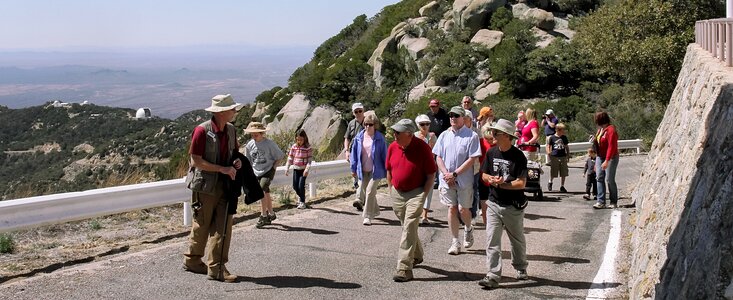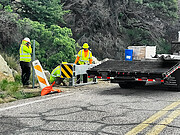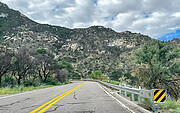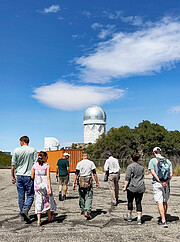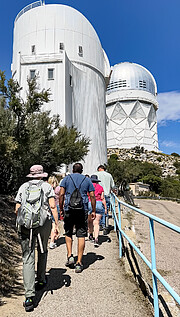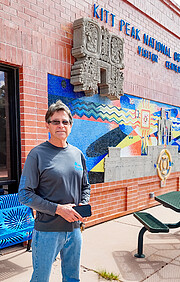Observatorio Nacional Kitt Peak reinicia visitas del público
21 Septiembre 2023
A partir del viernes 22 de septiembre, el Observatorio Nacional de Kitt Peak comenzará un programa de reapertura limitada para dar la bienvenida al público que podrá visitar sus instalaciones, luego de más de tres años de cierre como resultado de la pandemia de COVID-19 y del incendio Contreras. La histórica cima de KPNO dará la bienvenida a los visitantes para que disfruten de sus visitas guiadas diurnas y de los programas de observación nocturna.
A partir del 22 de septiembre, el Observatorio Nacional de Kitt Peak (KPNO), un Programa de NOIRLab de NSF, reiniciará las visitas guiadas diurnas para el público los días viernes, sábados y domingos a través del centro de visitas de Kitt Peak [1]. Las disposiciones de seguridad posteriores al Incendio Contreras y la limitada disponibilidad de estacionamiento implican que el acceso sólo sea posible a través de reservas anticipadas. Se invita a los visitantes a reservar con bastante antelación, ya que sólo hay 60 cupos disponibles por día. Cualquier persona que desee recorrer el campus de Kitt Peak va a requerir una reserva.
Durante los recorridos, los visitantes podrán explorar la rica variedad de telescopios de KPNO —la colección más grande y diversa del mundo—, así como su historia y sus descubrimientos. Entre los aspectos más destacados del recorrido se encuentra una visita al Telescopio Nicholas U. Mayall de 4 metros, hogar del estudio DESI (Dark Energy Spectroscopic Instrument). Este proyecto, que gestiona el Departamento de Energía de los Estados Unidos, tiene como objetivo estudiar la misteriosa energía oscura mediante la creación de un mapa en 3D de más de 40 millones de galaxias. Un segundo recorrido lleva a las instalaciones del Telescopio KPNO de 2,1 metros, uno de los primeros telescopios instalados en Kitt Peak y que se utiliza tanto para imágenes como para espectroscopía.
Además de reanudar los recorridos nocturnos, KPNO reanudó su Programa de Observación Nocturna con Telescopios. A través de este programa personalizado, cualquier persona puede vivir la experiencia de ser un astrónomo durante una noche completa. En él, las visitas tienen acceso toda la noche a un telescopio que pueden utilizar para realizar observaciones visuales (mirando un objeto directamente a través de un ocular) o capturar imágenes de objetos en el espacio profundo. Los boletos para esta experiencia única están disponibles en Eventbrite. Se espera que los programas nocturnos, como el Programa de Observación Nocturna y el Programa de Descubrimiento del Cielo Nocturno, regresen en octubre. Suscríbete a nuestra lista de Eventbrite para recibir notificaciones sobre nuevos eventos.
Kitt Peak estará cerrado a las visitas de lunes a jueves, hasta finales de septiembre. Los visitantes pueden esperar más días de puertas abiertas en octubre próximo.
Si bien las visitas autoguiadas a los sitios de los observatorios no son posibles por ahora, la ruta SR386 es una vía pública, por lo que los ciclistas y automovilistas que deseen disfrutar de la desafiante y hermosa ruta hacia la montaña son bienvenidos sin reservas. Algunas partes de la montaña, como la zona de picnic, aún están inaccesibles debido a los daños causados por el incendio. Si bien el Centro de Visitas está abierto para comprar regalos locales hechos a mano, no se pueden comprar alimentos ni bebidas en la montaña, por lo cual debe traer sus propios refrigerios. Hay baños disponibles cerca del estacionamiento del Centro de Visitas.
Tanto KPNO como NOIRLab están muy agradecidos por los esfuerzos del Departamento de Transportes de Arizona (ADOT) para reparar los daños causados por el incendio que afectó a la ruta 386 y a la vía de acceso al observatorio. El camino fue reparado y equipado con nuevas barandas más seguras. También se realizaron reparaciones en los bordes del terraplén de la carretera, así como también se implementaron parches en la misma, reparaciones de alcantarillas y nuevos trazados de líneas demarcatorias.
La Directora Asociada de KPNO, Michelle Edwards, expresó que “realmente apreciamos el arduo trabajo de ADOT para efectuar estas importantes reparaciones; el público puede volver a experimentar las maravillas del Universo en la cima de Kitt Peak”.
Más Información
[1] El centro de visitas de Kitt Peak abrió sus puertas en 1964 y celebrará su aniversario número 60 en 2024.
NOIRLab de NSF (Laboratorio Nacional de Investigación en Astronomía Óptica-Infrarroja de NSF), el centro de EE. UU. para la astronomía óptica-infrarroja en tierra, opera el Observatorio internacional Gemini (una instalación de NSF, NRC–Canada, ANID–Chile, MCTIC–Brasil, MINCyT–Argentina y KASI – República de Corea), el Observatorio Nacional de Kitt Peak (KPNO), el Observatorio Interamericano Cerro Tololo (CTIO), el Centro de Datos para la Comunidad Científica (CSDC) y el Observatorio Vera C. Rubin (operado en cooperación con el National Accelerator Laboratory (SLAC) del Departamento de Energía de Estados Unidos (DOE). Está administrado por la Asociación de Universidades para la Investigación en Astronomía (AURA) en virtud de un acuerdo de cooperación con NSF y tiene su sede en Tucson, Arizona. La comunidad astronómica tiene el honor de tener la oportunidad de realizar investigaciones astronómicas en Iolkam Du’ag (Kitt Peak) en Arizona, en Maunakea, en Hawai‘i, y en Cerro Tololo y Cerro Pachón en Chile. Reconocemos y apreciamos el importante rol cultural y la veneración que estos sitios tienen para la Nación Tohono O’odham, para la comunidad nativa de Hawai‘i y para las comunidades locales en Chile, respectivamente.
Enlaces
Contactos
Michelle Edwards
Associate Director of Kitt Peak National Observatory
Correo electrónico: michelle.edwards@noirlab.edu
Garin Groff
ADOT Public Information Officer
Correo electrónico: ggroff@azdot.gov
Josie Fenske
NSF NOIRLab Communications
Correo electrónico: josie.fenske@noirlab.edu
Lars Lindberg Christensen
Head of Communications, Education & Engagement
Tucson, United States
Correo electrónico: lars.christensen@noirlab.edu

